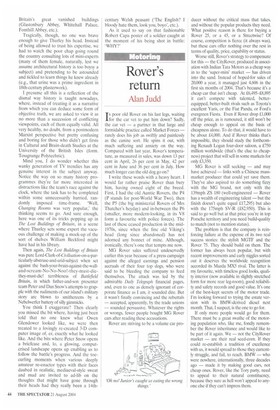Rover's return
Alan Judd
Ispoor old Rover on his last legs, waiting for the car vet to put him down? Sadly, the car vet — a partner in that large and formidable practice called Market Forces — rarely does his job as swiftly and painlessly as the canine sort. He spins it out, with much suffering and anxiety on the way. Compared with last year, Rover's temperature, as measured in sales, was down 13 per cent in April, 26 per cent in May, 42 per cent in June and 36 per cent in July. How much longer can the old dog go on?
I write these words with a heavy heart. I would far rather praise Rover than bury him, having owned eight of the breed. First, I had the old Auntie Rovers, the P4 (P stands for post-World War Two), then the P5 (the big ministerial Rovers of Mrs Thatcher's heyday) and in-between the P6 (smaller, more modern-looking, in its V8 form a favourite with police forces). The last of these ceased production in the mid1970s, since when the fine old Viking's head (long since abandoned) has not adorned any bonnet of mine. Although, ironically, there's one that tempts me now.
MG Rover sales suffered undeservedly earlier this year because of a press campaign against the alleged earnings and pension accruals of their four top dogs, who were said to be bleeding the company to feed themselves. The attack was led by the admirable Daily Telegraph financial pages, and, even to one as densely ignorant of corporate finance as I am, it sounded dire. But it wasn't finally convincing and the rebuttals accepted, apparently, by the trade unions — sounded persuasive. Whatever the rights or wrongs, fewer people bought MG Rover cars after reading these accusations.
Rover are striving to be a volume car pro ducer without the critical mass that takes, and without the popular products they need. What positive reason is there for buying a Rover 25, or a 45, or a Streetwise? Of course, competition is fierce (it always was), but these cars offer nothing over the rest in terms of quality, price, capability or status.
Worse still, Rover's strategy to compensate for this — the CityRover, produced in association with Indian Tata Motors as a cheap way in to the 'super-mini' market — has driven into the sand. Instead of hoped-for sales of 20,000 a year, it managed just 4,606 in the first six months of 2004. That's because it's a cheap car that isn't cheap. At £6,495-£8,895 it can't compete with talented, betterequipped, better-built rivals such as Toyota's excellent Yaris, or the Fiat Panda, or Ford's evergreen Fiesta. Even if Rover drop £1,000 off the price, as is rumoured, it still won't be cheap enough to appeal on the basis of cheapness alone. To do that, it would have to be about £4,000. And if Rover thinks that's impossible, they should study the forthcoming Renault Logan four-door saloon. a £750 million worldwide (that's the clue to cheapness) project that will sell in some markets for only £3,350.
MG Rover is still seeking — and may have achieved — links with a Chinese massmarket producer that could yet save them. They've also aspired to do something fizzy with the MG brand, not only with the 139mph ZS 180 (well-engineered — Rover has a wealth of engineering talent — but the finish doesn't quite equal £17,295) but also with the 175mph SV-R (£82,950). This is said to go well but at that price you're in top Porsche territory and you need build-quality to match (not to mention status).
The problem is that the company is reinforcing failure at the expense of its two real success stories: the stylish MGTF and the Rover 75. They should build on them. The former has always been popular, but with recent improvements and early niggles sorted out it deserves the worldwide recognition accorded its Mazda MX5 rival. The latter is my favourite, with timeless good looks, quality interior (now available in slightly stretched form for more rear leg-room), good reliability and safety records and good value. It's one of the best-kept secrets of the motor trade. I'm looking forward to trying the estate version with its BMW-derived diesel next month. That, I suspect, is the one to go for.
If only more people would go for them. There must be a great swathe of the motoring population who, like me, fondly remember the Rover inheritance and would like to be part of it again. We — not the CityRover market — are their real seed-corn. If they could re-establish a tradition of excellence with us, it would spread to those they currently struggle, and fail, to reach. BMW — who were nowhere, internationally, three decades ago — made it by making good cars, not cheap ones. Rover, like the Tory party, need to appeal to their natural constituency, because they sure as hell won't appeal to anyone else if they can't impress them.


























































 Previous page
Previous page